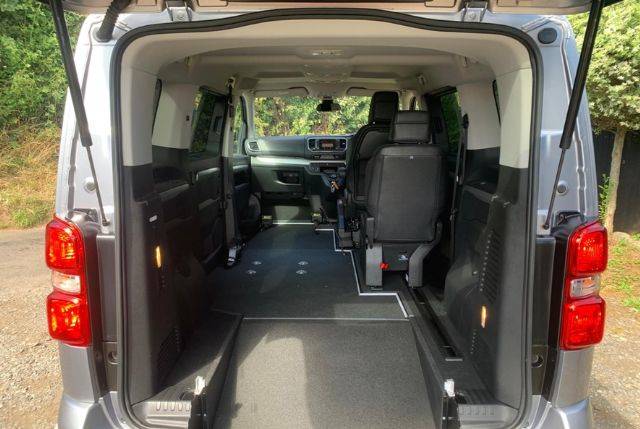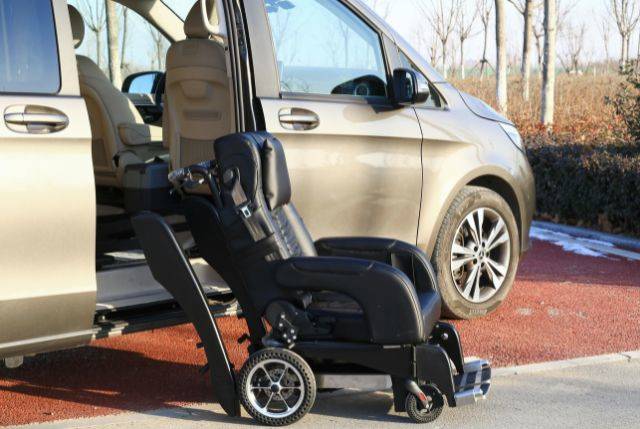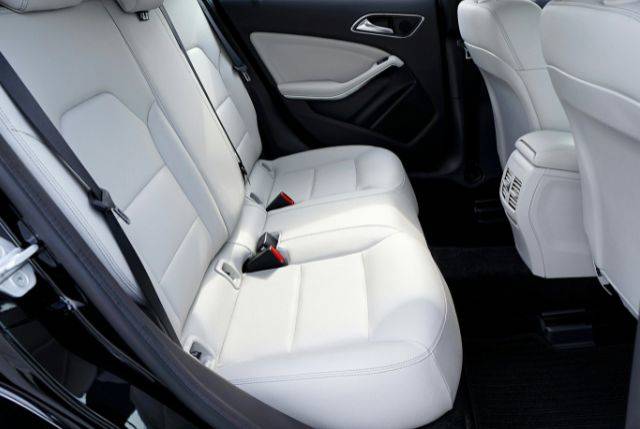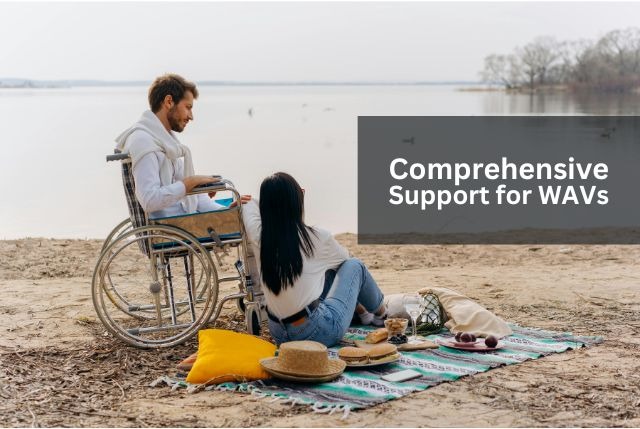Comprehensive Support for WAVs
In a world that increasingly values inclusivity and accessibility, the need for Wheelchair Accessible Vehicles (WAVs) has never been more critical. For individuals with mobility challenges, WAVs represent not just a mode of transportation but a gateway to independence and freedom. These specially designed vehicles enable users to travel comfortably and safely, allowing them to participate fully in everyday activities—from commuting to work and attending social events to enjoying leisure outings.
The Importance of WAVs for Individuals with Mobility Challenges
WAVs are essential for enhancing the quality of life for those with disabilities. They provide the necessary accommodations, such as ramps or lifts, spacious interiors, and secure wheelchair tie-downs, ensuring that users can travel without barriers. Beyond mere convenience, WAVs empower individuals by fostering independence, improving access to essential services, and encouraging social interaction. Whether you are considering purchasing a WAV or exploring rental options, our goal is to provide you with valuable insights and practical advice. We will cover key considerations when choosing a WAV, available features, financing options, and resources to help you make informed decisions. By the end of this article, we hope to equip you with the knowledge and confidence needed to navigate the world of WAVs effectively.
Key Considerations When Choosing a WAV
When selecting a Wheelchair Accessible Vehicle (WAV), several critical factors must be taken into account to ensure that the vehicle meets the specific needs of the user. Here are the primary considerations:
1.SIZE AND SPACE

Importance of Headroom and Access for Wheelchair Users
One of the most crucial aspects of a WAV is its interior space, particularly headroom. A lowered floor design is often essential, as it allows for increased headroom, making it easier for wheelchair users to enter and exit the vehicle comfortably. This design also minimises the ramp's angle, facilitating smoother access. Adequate space not only enhances comfort but also accommodates any mobility aids or personal items that may need to be transported.
Citroen Berlingo WAVs & Berlingo Multispace wheelchair accessible vehicles are renowned for excellent headroom and access for wheelchair users. The vehicle offers exceptional spatial features specifically designed for wheelchair accessibility. Check out our used Citroen WAV range.
2.ADAPTATIONS

Overview of Common Adaptations
WAVs can be customised with various adaptations to enhance accessibility:
- Lowered Floors: This modification provides more headroom and reduces the ramp's steepness, making it easier for users to roll in and out of the vehicle.
- Ramps and Lifts: Most WAVs are equipped with ramps—either manual or automatic. For larger vehicles, lifts may be installed to assist in loading and unloading. The choice between ramps and lifts often depends on the user’s specific needs and preferences.
- Kneeling Systems: Some WAVs feature hydraulic kneeling systems that lower the vehicle to reduce ramp angle, further easing access.
These adaptations are vital for ensuring safe and convenient transportation for wheelchair users.
Dacia WAVs, particularly the Dacia Jogger, have several common adaptations such as access & interior, safety features & technology adaptations.
3.PASSENGER CAPACITY

Discussing Additional Seats and Configuration Options
The number of passengers a WAV can accommodate is another significant consideration. WAVs come in various sizes—small, medium, and large—each offering different seating configurations:
- Small WAVs, such as the Fiat Qubo, Ford Tourneo Connect, the Vauxhall Combo & the Volkswagen Caddy, typically seat up to five people, including the wheelchair user.
- Medium WAVs, such as the Ford Grand Tourneo Connect, Volkswagen Caddy Maxi, & the Peugeot Rifter, can accommodate 7 passengers, allowing for more flexible arrangements.
- Large WAVs, like the Renault Trafic, Peugeot Traveller, & the Toyota Proace Verson, often designed for larger groups or families, can carry up to nine passengers and may even allow multiple wheelchair users.
Understanding how many additional seats are needed and how they can be configured is essential for ensuring that the vehicle meets your transportation requirements. Whether you need space for family members, caregivers, or additional mobility aids, selecting the right configuration will enhance your overall experience with the WAV.
4.BUYING vs. LEASING A WAV
When considering a Wheelchair Accessible Vehicle (WAV), individuals often face the decision of whether to buy outright or lease through programs like the Motability Scheme. Each option has its own set of advantages and disadvantages, which are important to evaluate based on personal needs and financial circumstances.
Pros and Cons of Purchasing a WAV Outright
Pros:
- Complete Ownership: Purchasing a WAV outright means you own the vehicle, allowing for full control over modifications and usage without restrictions.
- No Mileage Restrictions: Unlike leasing options, there are no limits on how far you can drive, making it ideal for those who travel frequently.
- Potential Resale Value: Once you no longer need the vehicle, you can sell it and recoup some of your investment.
Cons:
- High Initial Costs: New WAVs can be expensive, and if financing is needed, it typically requires passing a credit check.
- Ongoing Costs: You are responsible for all expenses related to insurance, maintenance, servicing, and breakdown assistance.
- Depreciation: The vehicle will lose value over time, which may affect resale potential.
Overview of Leasing Options Through Schemes Like Motability
Leasing through the Motability Scheme offers an alternative that may be more suitable for many individuals:
- All-Inclusive Package: The scheme covers insurance, maintenance, servicing, and breakdown assistance, providing peace of mind without additional costs
- New Vehicle Every Five Years: Users have the opportunity to drive a brand new WAV every five years, ensuring access to the latest models and adaptation
- Financial Assistance: For those on qualifying benefits, there are means-tested grants available to help with upfront costs or adaptations needed during the lease
However, leasing also comes with some limitations:
- Mileage Restrictions: The standard lease allows for up to 100,000 miles over five years, which may not suit everyone’s travel habits
- No Ownership: At the end of the lease term, you must return the vehicle and will not have any asset to sell or trade in
5.FINANCIAL CONSIDERATIONS
When deciding between buying and leasing a WAV, several financial factors should be considered:
- Grants and Financial Aid: Various grants may be available to assist with purchasing or leasing costs. For instance, the Motability Scheme offers grants for individuals who qualify based on their financial situation
- Insurance Costs: Leasing through Motability includes insurance coverage for up to three named drivers, while purchasing requires you to arrange your own insurance
- Long-term Costs: Evaluate whether leasing or buying will be more economical in the long run. While leasing may seem more affordable initially due to lower upfront costs, purchasing could be more financially advantageous over time if you plan to keep the vehicle for many years.
By weighing these pros and cons alongside individual needs and financial situations, potential WAV users can make informed decisions that best suit their lifestyles.
Resources for WAV Support
Finding the right support and information when seeking a Wheelchair Accessible Vehicle (WAV) can significantly ease the process. Numerous organisations and online platforms are dedicated to assisting individuals with mobility challenges in navigating their options.
Organisations Providing Information and Assistance
One of the most prominent resources is the Motability Scheme, which offers leasing options for qualifying wheelchair users. This organisation covers various costs, including insurance, maintenance, and servicing, providing a comprehensive range of WAVs tailored to individual needs. Their website features tools for eligibility checks and vehicle selection, making it easier for users to find suitable options.
In addition to national programs, many local charities focus on mobility solutions for individuals with disabilities. These organisations often provide guidance, financial assistance, or grants to help with purchasing or leasing WAVs. Local disability support groups and community organisations specialising in mobility aids can be invaluable resources.
Maintenance and Aftercare
Regular maintenance is crucial for ensuring the safety and reliability of Wheelchair Accessible Vehicles (WAVs). Just like any vehicle, WAVs require consistent upkeep to function optimally and provide peace of mind for users. This includes routine checks on essential components such as ramps, lifts, securement systems, and overall vehicle performance.
Importance of Regular Maintenance
Maintaining a WAV involves several key tasks that directly impact safety and functionality. Regular inspections should include checking wheelchair ramps and lifts for wear or damage, ensuring they operate smoothly. Additionally, it's vital to regularly assess wheelchair tie-downs and occupant restraints for any signs of deterioration. These components are essential for securing the wheelchair during transit, reducing the risk of accidents caused by movement or instability.
Routine car maintenance, such as oil changes, brake inspections, and tire checks, also plays a significant role in vehicle reliability. By adhering to a regular maintenance schedule, users can prevent unexpected issues that could compromise both safety and convenience.
Overview of Aftercare Services Offered by WAV Suppliers
WAV suppliers typically provide a range of aftercare services designed to support users long after the initial purchase or lease. These services often include regular servicing and repairs conducted by certified technicians who specialise in WAVs. Such expertise ensures that modifications and adaptations are maintained correctly, preserving the vehicle's functionality and safety features.
Many suppliers also offer warranties that cover specific components or systems within the WAV. This can provide additional reassurance to users, knowing that any potential issues will be addressed without incurring extra costs. Furthermore, reliable after-sales support is crucial; choosing a dealer known for excellent customer service can lead to prompt assistance with any maintenance needs or concerns.
In summary, regular maintenance and robust aftercare services are essential for keeping WAVs in top condition. By prioritising these aspects, users can enjoy safe and reliable mobility while minimising the risk of unexpected breakdowns or safety issues.
Conclusion
Choosing the right Wheelchair Accessible Vehicle (WAV) is a significant decision that can greatly impact the quality of life for individuals with mobility challenges. The right WAV not only enhances independence and accessibility but also ensures safety and comfort during travel. With various models, adaptations, and support services available, it’s essential to consider personal needs carefully when making this choice.
As you explore your options, we encourage you to seek out further information and support. Utilise resources such as the Motability Scheme, local charities, and online platforms dedicated to WAVs. Engaging with these resources can provide valuable insights and guidance tailored to your specific situation.
Remember, the journey to finding the perfect WAV is not just about transportation; it’s about empowering yourself or your loved ones to live life fully and without barriers. Take the time to research, ask questions, and connect with experts to ensure that you make an informed decision that best suits your lifestyle and needs. Contact our Kidderminster dealership and speak with one of experts if you need more advice on choosing the right used WAV.

